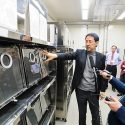WARF, UW-Madison influenza researcher, Lentigen agree to donate technology
The University of Wisconsin–Madison has received a $1.3 million grant from the Bill & Melinda Gates Foundation to support research aimed at understanding the molecular features that lead to influenza pandemics. UW–Madison will collaborate with Maryland-based Lentigen Corp. on the project.
As part of the grant, the Wisconsin Alumni Research Foundation (WARF) and Lentigen Corp. have agreed to broadly disseminate the knowledge generated in this project to the scientific community. This means that key pieces of the intellectual property created during the project will be donated by WARF to the international research community in an effort to improve human health across the globe.
Led by renowned influenza researcher Yoshihiro Kawaoka, the project will use high-throughput screening systems to sift through influenza viral protein libraries to identify mutations that would allow avian influenza to infect humans.
Kawaoka, who has a joint appointment at the UW–Madison School of Veterinary Medicine and the University of Tokyo, created a method for screening avian influenza sequences to determine when the virus jumps from birds to humans. World health experts are concerned that such a jump would trigger a flu pandemic similar to the pandemics of 1918, 1957 and 1968. The global health disaster that occurred in 1918 killed between 20 million and 40 million people.
The intention of WARF and Lentigen is to make diagnostic tools and vaccines for avian flu accessible to people in the developing countries of the world.
"Our work in crafting this intellectual property policy will ensure broad access to this new tool for monitoring avian flu," says Carl E. Gulbrandsen, managing director of WARF. "This is what WARF is all about — getting new technologies out of the labs into society, where they can benefit human lives."
The grant is the first made by the Gates Foundation to UW–Madison to support a global public health initiative. A previous grant from the Gates Foundation was given to the Division of Library Sciences.
Lentigen Corp. will collaborate with UW–Madison on the study. Tim Ravenscroft, Lentigen’s chief executive officer, states, "We are delighted to work with the UW–Madison on this important project supported by the Gates Foundation."
Lentigen is a leader in the development and manufacture of lentiviral vectors, important tools for the study and manufacture of candidate vaccines. Lentigen’s founder and chief scientific officer Boro Dropulic comments, "We look forward to working with Dr. Kawaoka and his expert team on this exciting project. Our lentiviral vectors are particularly suited to high-throughput screening methods. One goal of this study is to use our system to help identify influenza protein mutants that would allow avian influenza to infect humans. The work will be important for the future development of vaccine candidates targeted to avian influenza that could cause a human pandemic."
WARF supports research at UW–Madison by protecting the intellectual property of faculty, staff and students, and licensing inventions resulting from their work. Through these efforts, university ideas benefit the public by bringing resources back to the university to continue the cycle of investment, research and invention. WARF was established in 1925 as the first university-based technology transfer office in the world.
Lentigen Corp. is a privately owned biotechnology company focused on the development of lentiviral vector technology for a wide range of therapeutic, vaccine and research applications in biotechnology and medicine. Lentiviral vectors are the most efficient vehicles for the delivery of genes or gene-silencing sequences stably into cells. Lentigen is a highly collaborative company, co-developing lentiviral vector-based products across a broad spectrum of bench to clinical applications. Partnerships include the National Institutes of Health, the University of Pennsylvania, ThermoFisher Scientific and the U.S. Army.


